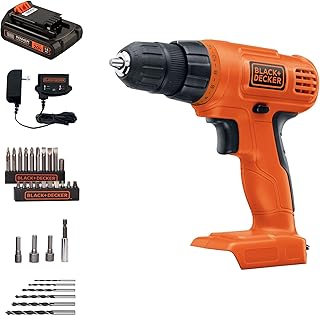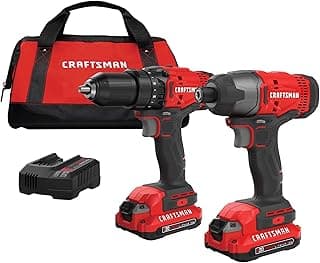When buying a cordless drill, voltage plays a crucial role in determining power and efficiency. But here’s the real question — what’s the best voltage for cordless drill for your needs? Should you prioritize compact size, or go all-in on power?
If you’re looking for all-around versatility, check out our guide to the best cordless drill. Need something smaller for quick fixes? You’ll love the best small lightweight cordless drill. And if you want a perfect mix of power and balance, don’t miss our pick for the best lightweight powerful cordless drill.
Keep reading — because what you’ll learn next could save you from overspending on the wrong tool. Let’s break down which voltage rating gives you the best performance for every kind of project.
Our Top Picks
Best Compact Power: DEWALT 20V Max Cordless Drill/Driver Kit
The DEWALT 20V Max Cordless Drill/Driver Kit (DCD771C2) is designed for convenience and reliability in both home and professional projects. With its compact and lightweight build, it fits easily into tight spaces and reduces fatigue during long hours of use. The high-performance motor delivers 300 unit watts out, offering enough power to handle most drilling and fastening applications with ease. Its two-speed transmission—ranging from 0–450 to 1,500 RPM—gives users better control for precision or speed, depending on the task. The ½-inch keyless chuck ensures secure bit retention, while the ergonomic handle provides a comfortable grip.
From a customer standpoint, this drill performs consistently well for medium-duty work. Users appreciate its portability and efficiency, though the 1.3Ah batteries can drain faster on demanding tasks. The absence of an LED light is also a minor drawback for those working in dim environments.
Overall, the DEWALT 20V Max Cordless Drill offers dependable performance, practical design, and solid value for its price. It’s an excellent all-around choice for homeowners and professionals seeking a balance of power, comfort, and versatility.
Best Budget Pick: CRAFTSMAN V20 Cordless Drill/Driver Kit
The CRAFTSMAN V20 Cordless Drill/Driver Kit (CMCD700C1) offers reliable everyday performance in a practical, budget-friendly package. Powered by a 20V lithium-ion battery, it delivers 280 unit watts out—suitable for light to medium-duty tasks such as drilling into wood, metal, or plastic. The 2-speed gearbox (0–350 and 0–1,500 RPM) allows users to switch between control and speed, while the ½-inch keyless chuck simplifies bit changes. An integrated LED light adds visibility in low-light environments, enhancing precision during detailed work.
From a user’s perspective, the drill feels sturdy and comfortable, with a balanced design that reduces hand fatigue. Homeowners appreciate its ease of use and quick charging time—fully recharging in under an hour. However, the lower torque output means it’s less ideal for heavy-duty applications, and the 1.3Ah battery limits extended runtime.
Overall, the CRAFTSMAN V20 Cordless Drill stands out for its solid build, convenience, and affordability. It’s a dependable option for DIYers and occasional users who want a straightforward, capable drill without overspending.
Best for Beginners: BLACK+DECKER 20V MAX Cordless Drill Kit
The BLACK+DECKER 20V MAX Cordless Drill Kit (BCD702C1) is designed with simplicity and ease of use in mind, making it a solid entry-level tool for everyday home projects. Its 20V MAX lithium-ion battery provides dependable power and decent runtime for small to medium tasks like assembling furniture, drilling into wood, or tightening screws. The variable-speed trigger offers good control, while the 11-position clutch helps prevent overdriving or stripping screws—an essential feature for beginners. The built-in LED light improves visibility in dim areas, and the integrated bit holder adds convenience by keeping accessories within easy reach.
From a customer’s standpoint, this drill is lightweight, comfortable to hold, and ideal for quick jobs around the house. Users appreciate its balance and straightforward operation, though its single-speed design and modest torque limit its use for heavier materials or long work sessions.
Overall, the BLACK+DECKER 20V MAX Drill Kit delivers solid value for casual users. It’s not built for professional-grade demands, but its reliability, ease of handling, and thoughtful design make it a great fit for homeowners and DIY enthusiasts seeking an affordable, no-fuss cordless drill.
FAQs
Is 18V or 21V better?
An 18V drill is often the sweet spot for most users. It offers enough torque and runtime for heavy-duty drilling, making it ideal for professionals and serious DIYers. A 21V drill, on the other hand, sounds more powerful — but the difference is often marketing. In most cases, 21V is simply the maximum voltage from a fully charged 18V battery (nominal vs. peak voltage). Practically speaking, performance differences are minimal. Choose 18V if you want proven reliability and broad compatibility with tools and batteries from top brands.
Is a 12V or 20V drill better?
A 12V drill is lighter, compact, and perfect for small projects like furniture assembly or drilling into drywall. Meanwhile, a 20V drill delivers higher torque and longer runtime, making it suitable for demanding materials such as hardwood or metal. If portability and comfort are your top priorities, 12V is the way to go. But if you need professional-level performance, a 20V drill offers more power and versatility for complex tasks.
Is a 12V or 18V drill better?
The 12V drill wins on maneuverability and convenience — great for tight spaces and household use. However, if you frequently work with denser materials or larger screws, the 18V drill provides noticeably stronger torque and endurance. In other words, 12V is ideal for light-duty applications, while 18V bridges the gap between home and professional use. For many users, 18V offers the best balance of power, runtime, and cost.
What is better, an 18-volt or 20-volt drill?
This comparison often causes confusion. In reality, 18V and 20V drills are almost identical in performance. The difference lies in labeling: 18V refers to nominal voltage (average working voltage), while 20V denotes maximum voltage (when fully charged). Manufacturers use “20V” mainly for marketing appeal. Both types use the same lithium-ion cell configuration and produce similar power outputs. So, choosing between them should depend on brand preference, ergonomics, and tool ecosystem — not just voltage numbers.
Conclusion
When it comes to finding the best voltage for cordless drill, remember: higher voltage doesn’t always mean better performance. For light household tasks, 12V is efficient and portable. For versatile use, 18V remains the industry favorite. And while 20V and 21V options promise more power, they’re often just rebranded versions of 18V models. Ultimately, the best choice depends on how — and how often — you plan to use your drill.






















